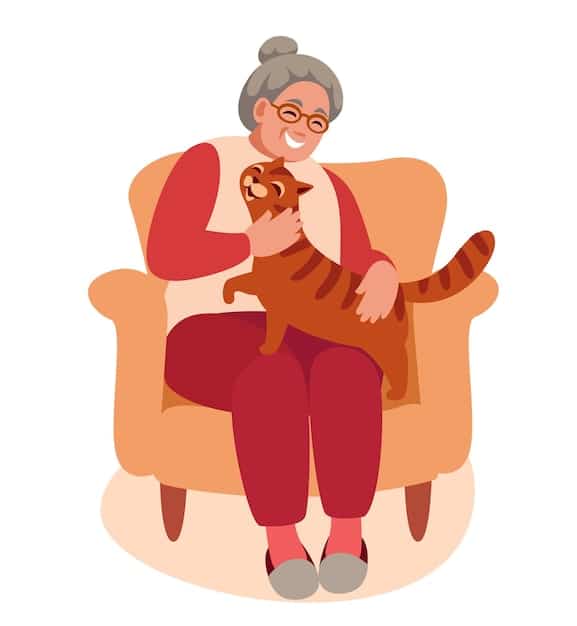Pet Ownership’s Impact on Mental Health: New Research for 2025

New research in 2025 highlights the profound impact of pet ownership on human mental health, revealing significant benefits such as reduced stress, increased social interaction, and improved overall well-being, particularly in urban environments and among older adults.
Are you curious about how our furry, scaly, or feathered friends will be affecting our minds in the near future? New Research: The Impact of Pet Ownership on Human Mental Health in 2025 is revealing fascinating insights into the powerful connection between humans and animals. Get ready to explore how pets will continue to shape our mental well-being.
The Evolving Role of Pets in Mental Wellness
The bond between humans and animals has always been special, but its significance in our mental well-being is becoming increasingly clear. As we move closer to 2025, new research is shedding light on how pet ownership can serve as a critical component of our mental health toolkit.
From reducing feelings of loneliness to providing much-needed emotional support, pets play a multifaceted role in our lives. Let’s explore how this relationship is evolving and what we can expect in the coming years.
Companionship and Reduced Loneliness
One of the most significant ways pets support our mental health is by providing companionship. This is especially crucial in today’s society, where feelings of isolation and loneliness are on the rise. The simple act of having a pet can make a world of difference.
Emotional Support and Stress Reduction
Pets are masters at providing emotional comfort. Whether it’s a comforting purr, a wagging tail, or a wet nose nudge, these small gestures can significantly reduce stress and anxiety. The unconditional love and support provided by pets can be incredibly therapeutic.
- 🐶 Increased Social Interaction: Walking a dog, visiting a pet store, or even talking about your pet online can boost social interactions.
- 🐱 Stress Hormone Regulation: Studies have shown that interacting with pets can lower cortisol levels, reducing stress.
- 🦜 Routine and Purpose: Caring for a pet provides a daily routine and a sense of purpose, which can be particularly beneficial for those struggling with depression.
- 🐠 Unconditional Love: Pets offer non-judgmental companionship, which can be a powerful buffer against feelings of loneliness and isolation.
In conclusion, the evolving role of pets in mental wellness underscores their importance as companions and sources of emotional support. As we look to 2025, integrating pets into our mental health strategies may prove to be a valuable approach.

Mental Health Benefits for Specific Demographics
While the benefits of pet ownership are universal, certain demographics experience unique mental health advantages from having a pet. Understanding these specific benefits can help tailor mental health strategies to better meet the needs of different populations.
Let’s delve into how pets uniquely impact the mental health of older adults, children, and individuals with pre-existing mental health conditions.
Older Adults: Combating Loneliness and Cognitive Decline
For older adults, pets can be a lifeline against loneliness and cognitive decline. The companionship provided by pets helps combat feelings of isolation, while the responsibility of caring for a pet can keep their minds engaged and active.
Children: Emotional Development and Responsibility
Children also benefit significantly from pet ownership. Pets can teach children about responsibility, empathy, and emotional regulation. The bond between a child and a pet can be a source of comfort and security, promoting healthy emotional development.
- 👵 Reduced Social Isolation: Pets encourage seniors to stay active and interact with other pet owners, combating isolation.
- 🧒 Improved Social Skills: Children who grow up with pets often develop better social skills and emotional intelligence.
- 🐕🦺 Therapeutic for PTSD: Pets can provide comfort and reduce anxiety for individuals with post-traumatic stress disorder.
- 💪 Enhanced Self-Esteem: Caring for a pet can boost self-esteem and provide a sense of accomplishment.
In sum, understanding the demographic-specific mental health benefits of pet ownership allows us to develop targeted strategies that leverage these unique advantages. By recognizing the distinct ways pets support different groups, we can better promote mental well-being across the board.
The Science Behind the Pet-Human Connection
The remarkable impact of pets on our mental health isn’t just anecdotal; it’s backed by scientific research. Understanding the science behind this connection can further validate the importance of pet ownership in mental wellness strategies.
Let’s explore the physiological and psychological mechanisms that explain why pets have such a positive effect on our mental state.
Physiological Mechanisms: Hormones and Neurotransmitters
Studies have shown that interacting with pets can trigger the release of hormones and neurotransmitters that promote well-being. These include oxytocin, serotonin, and dopamine, all of which play a role in reducing stress and improving mood.
Psychological Mechanisms: Attachment and Social Support
From a psychological perspective, pets offer a profound sense of attachment and social support. This attachment provides a secure base, reducing feelings of anxiety and increasing overall life satisfaction. The non-judgmental nature of pets is particularly valuable in this regard.
- 🧠 Oxytocin Release: Petting a dog can increase oxytocin levels, promoting feelings of bonding and well-being.
- ❤️ Reduced Heart Rate: Interacting with pets has been shown to lower heart rate and blood pressure, reducing physiological stress.
- 😊 Increased Serotonin: The presence of pets can boost serotonin levels, helping to regulate mood and combat depression.
- 🤝 Social Facilitation: Pets can act as social catalysts, encouraging interaction and reducing feelings of isolation.
In conclusion, the science behind the pet-human connection highlights the profound physiological and psychological benefits of pet ownership. By understanding these mechanisms, we can further appreciate and leverage the role of pets in promoting mental health.

Challenges and Considerations in Pet Ownership
While pet ownership offers numerous mental health benefits, it’s essential to acknowledge the challenges and considerations that come with it. Being aware of these factors can ensure that pet ownership is a positive experience for both humans and animals.
Let’s explore the potential downsides and practical considerations of owning a pet, ensuring a balanced perspective.
Financial and Time Commitments
One of the primary challenges of pet ownership is the financial commitment. Pets require food, veterinary care, grooming, and other supplies, which can add up over time. Additionally, pets require a significant time investment for feeding, exercise, and companionship.
The responsibility can be hard.
Emotional Toll of Pet Loss
Another significant consideration is the emotional toll of pet loss. Losing a pet can be a deeply painful experience, and it’s essential to be prepared for this eventuality. The grief associated with pet loss can be intense and may require support.
- 💰 Financial Strain: Unexpected vet bills or the cost of specialized pet care can create financial stress.
- ⏰ Time Constraints: Balancing work, social life, and pet care can be challenging and lead to feelings of overwhelm.
- 😢 Emotional Distress: The death of a pet can trigger intense grief and feelings of loss, affecting mental well-being.
- 🏠 Lifestyle Changes: Pet ownership may require altering living arrangements and social activities.
In summary, acknowledging the challenges and considerations of pet ownership is crucial for ensuring a positive and sustainable relationship. By being prepared for the financial, time, and emotional commitments, individuals can maximize the benefits of pet ownership while minimizing potential downsides.
Future Trends: Pets as Mental Health Support Animals
As we look to 2025, the role of pets as mental health support animals is expected to grow significantly. Understanding these future trends can help us better integrate pets into mental health treatment plans and support systems.
Let’s discuss the emerging trends and innovations in the realm of pets and mental health care.
Increased Recognition of ESAs
Emotional Support Animals (ESAs) are gaining increased recognition as valuable components of mental health treatment. As awareness grows, more people are seeking ESAs to help manage conditions such as anxiety, depression, and PTSD.
Technology-Enhanced Pet Care
Technological advancements are also playing a role in enhancing pet care and mental health support. From wearable devices that track pet health to apps that connect pet owners with mental health professionals, technology is making it easier to care for pets and leverage their therapeutic benefits.
- 🐾 ESAs in Therapy: More therapists are incorporating ESAs into therapy sessions, recognizing their calming and supportive presence.
- 📱 Pet Health Apps: Apps are being developed to monitor pet behavior and provide insights into their well-being, helping owners provide better care.
- 🌐 Online Support Groups: Online communities are emerging where pet owners can share their experiences and support each other’s mental health.
- 🤖 AI-Powered Pet Care: Artificial intelligence is being used to analyze pet behavior and provide personalized care recommendations.
In closing, future trends in pet ownership highlight the growing importance of pets as mental health support animals. By staying informed about these trends and innovations, we can better leverage the therapeutic potential of pets in mental health care.
Integrating Pets into Your Mental Health Strategy
Incorporating pets into your mental health strategy can be a simple yet effective way to improve your overall well-being. Whether you already own a pet or are considering getting one, there are several ways to harness the mental health benefits they offer.
Let’s explore practical tips and strategies for integrating pets into your daily life to enhance your mental well-being.
Mindful Interaction with Pets
One of the simplest ways to benefit from pet ownership is to engage in mindful interaction with your pet. Taking the time to truly connect with your pet – whether through petting, playing, or simply being present – can promote relaxation and reduce stress.
Creating a Pet-Friendly Environment
Creating a pet-friendly environment can also enhance the mental health benefits of pet ownership. This includes providing a safe and comfortable space for your pet, as well as ensuring they have access to toys, exercise, and social interaction.
- 🧘♀️ Mindful Petting: Focus on the sensation of petting your pet, letting go of distractions and being fully present in the moment.
- 🚶♀️ Daily Walks: Regular walks with your dog can boost both your physical and mental health.
- 🏡 Creating Safe Spaces: Ensure your pet has a quiet, comfortable space to retreat to when they feel overwhelmed.
- 💖 Unconditional Acceptance: Embrace the non-judgmental love and support your pet offers, allowing yourself to be vulnerable and authentic.
In conclusion, integrating pets into your mental health strategy can be a rewarding and effective approach to improving your overall well-being. By engaging in mindful interaction, creating a pet-friendly environment, and incorporating pets into your daily routine, you can harness the numerous mental health benefits they offer.
| Key Point | Brief Description |
|---|---|
| 😊 Reduced Stress | Petting animals lowers cortisol levels, promoting relaxation. |
| 🐾 Companionship | Pets combat loneliness, especially for older adults and those isolated. |
| 🐕 Social Interaction | Walking dogs and visiting pet stores increases social activity and connections. |
| 💖 Unconditional Love | Pets offer non-judgmental support, boosting self-esteem and well-being. |
FAQ
▼
Interacting with pets has been shown to lower cortisol levels, the hormone associated with stress, and increase oxytocin, which promotes feelings of well-being and relaxation.
▼
Yes, pets provide companionship and a sense of connection, which can be particularly beneficial for those who live alone or experience feelings of isolation.
▼
The best type of pet depends on individual preferences and lifestyles. Dogs, cats, birds, and even fish can provide companionship and improve mental well-being.
▼
Schedule regular playtime, walks, or cuddle sessions with your pet. Mindful interaction, where you focus on the present moment, can maximize the benefits.
▼
Emotional Support Animals (ESAs) provide comfort and support but aren’t trained for specific tasks. Service animals undergo specialized training to assist individuals with disabilities.
Conclusion
As we move closer to 2025, new research continues to reinforce the significant impact of pet ownership on human mental health. From reducing stress and combating loneliness to fostering emotional development and providing unconditional love, pets offer a wide array of benefits. By understanding these advantages and integrating pets into our mental health strategies, we can harness the power of the pet-human connection to improve our overall well-being, creating a healthier and happier future for ourselves and our beloved animal companions.





